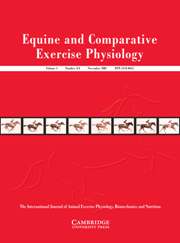No CrossRef data available.
Article contents
Intermittent administration of human parathyroid fragment (hPTH 1-37) on calcium and phosphorus homeostasis and bone markers in resting horses: a preliminary study
Published online by Cambridge University Press: 09 March 2007
Abstract
Parathyroid hormone (PTH) has been shown to have anabolic and catabolic effects on the skeleton, and in young racing horses the anabolic effects of PTH on bone might be of great importance in reducing the risk of skeletal injury during race training. The aim of this pilot study was to elucidate the effects of intermittent exogenous application of human parathyroid fragment (hPTH 1-37) on calcium homeostasis and bone turnover in resting horses. Five horses were used in this study. Horses were treated subcutaneously with hPTH (hPTH 1-37, 0.5 μg kg−1 BW) daily at 600 h over a period of 28 days. A foregoing control trial was conducted under the identical test protocol without hPTH application. Blood samples were taken at defined times for the control and hPTH treatment to analyze ionized Ca (Ca++, AVL), total Ca (AAS), inorganic Pi (flame photometry), intact PTH (RIA), osteocalcin (ELISA) and ICTP (carboxyterminal telopeptide of type-I collagen, RIA). Eight hours after hPTH application, blood ionized Ca++ (days 1 and 28) and plasma Pi (days 1–28) increased significantly in comparison to the control. At day 1, 8 h after hPTH application, the decrease in intact plasma PTH was more pronounced after hPTH treatment than in the control, and plasma PTH levels were higher after treatment at day 14 (16 h post-injection, P<0.05), day 18 (16 h post-injection, ns) and day 24 (0 h post-injection). There were no treatment-related differences in total plasma Ca and bone markers. Intermittent PTH administration in healthy horses affected Ca and P homeostasis as well as endogenous PTH secretion, but bone turnover was not affected during the treatment period of 28 days.
- Type
- Research Article
- Information
- Copyright
- Copyright © Cambridge University Press 2005


